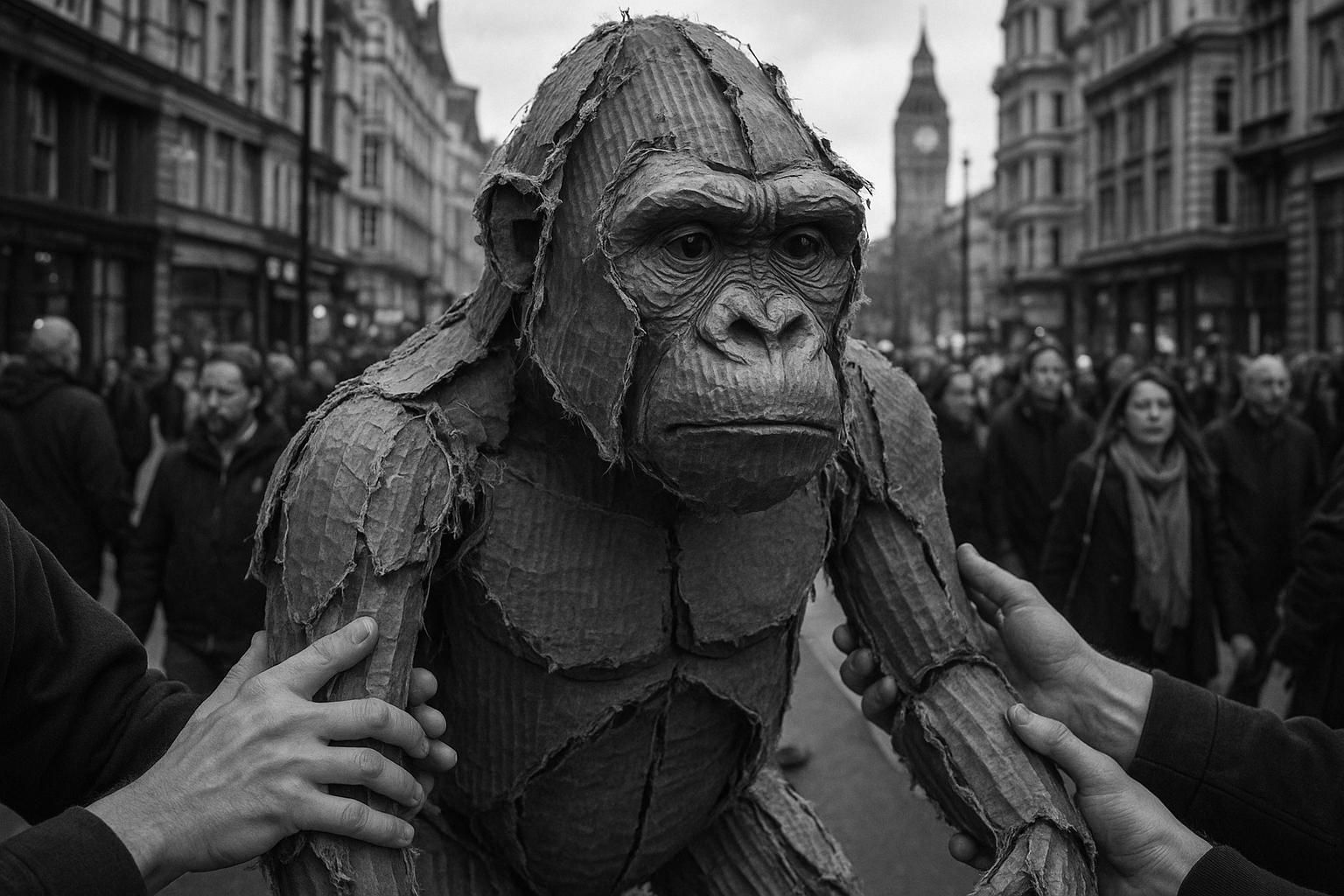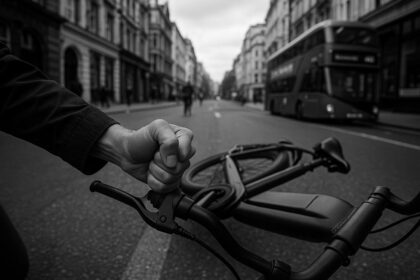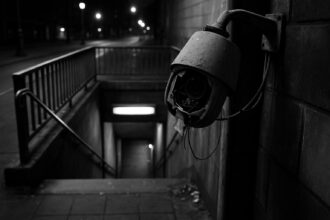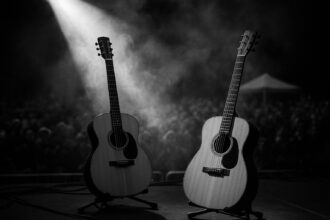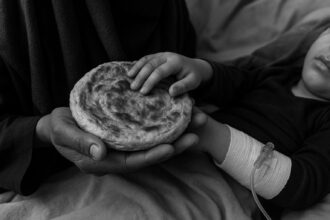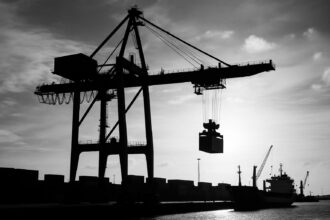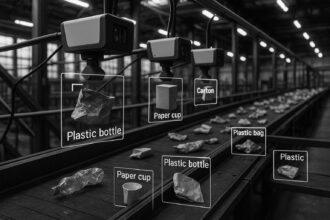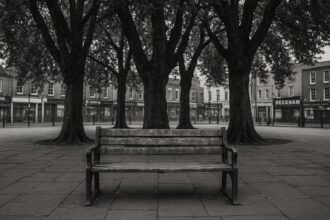A procession of fragile life-size animal puppets created by South African collective Ukwanda took to London’s streets, blending theatrical performances and symbolic storytelling to highlight the impact of climate-driven displacement across a 20,000km global journey.
In a striking fusion of art and urgent climate activism, The Herds took to the streets of central London, transforming the usual city bustle into a vivid tableau of a climate crisis narrative. Emerging from Soho Square, a procession of life-size puppet animals—monkeys, gorillas, and giraffes—made its way through iconic spots such as Greek Street, Cambridge Circus, and Covent Garden, captivating passersby with a deeply symbolic performance. This public art project, which began in April 2025, sees these puppets undertake a 20,000-kilometre journey from the Congo Basin to the Arctic Circle, representing the forced displacement of wildlife and humans caused by escalating climate disruptions.
Crafted by the South African collective Ukwanda, these puppets are designed with deliberate fragility, their corrugated cardboard bodies fraying at the edges and exposing inner frames—an evocative visual metaphor for vulnerability amidst resilience. Each puppet is animated by a team of puppeteers whose skillful manipulation brings the creatures to life not only through gesture but also through nuanced vocal expressions. The collective effort required, with three people controlling each gorilla and multiple operators managing the giraffes, underscores the project’s message about the necessity of collective action in confronting climate change.
The London segment of the journey intertwined the puppets’ slow march with immersive artistic performances. At Seven Dials, they circled the sundial pillar as the cast from the hit musical Matilda performed “When I Grow Up,” a song reflecting hope and future possibilities. The performance echoed the sentiments of climate activist Greta Thunberg’s 2019 UN speech, reminding audiences that “the eyes of all future generations are upon you.” Amidst the city’s sustained heatwave, the lyrics took on a more somber tone, juxtaposed against the tangible heat and symbolic vulnerability of the puppets.
Central London’s cultural spaces provided fitting stages for poignant moments. In Covent Garden, the renowned actor Juliet Stevenson delivered a dystopian monologue on climate-induced loss, softly interacting with one of the creatures in a moment that felt like an urgent call from nature itself. Later, the puppets paused outside the Royal Opera House where tenor Ryan Vaughan Davies sang from The Magic Flute, witnessed by attentive giraffes. Shakespeare’s themes of jealousy and disruption, explored in a special performance of A Midsummer Night’s Dream nearby, further deepened the project’s cultural resonance, with animals physically connecting to the actors as symbolic witnesses to human folly.
The journey concluded at Somerset House, where the puppets, tired and weathered, were gently laid to rest, their fragmented forms evoking haunting images of carcasses under the relentless summer sun. Accompanied by the riveting drumming of Andy Gangadeen, the final scene blended celebration and mourning, leaving spectators with a profound emotional imprint.
The Herds is co-curated by Amir Nizar Zuabi, artistic director of the project, and Joe Hill-Gibbins, a respected theatre and opera director, supported by a coalition of artists and environmentalists aiming to stir public consciousness and action. Since its launch, the project has visited multiple cities, including Manchester, and continues to travel as part of its ambitious 20,000 km route linking key global regions impacted by climate change.
Far from being mere spectacle, The Herds invites its audiences to witness the fragile beauty of nature and the shared urgency of environmental preservation, urging collective responsibility and hope amidst crisis. The project leaves behind not just memories of an extraordinary artistic event, but a galvanising call to action, reminding all that although the story unfolding around us is daunting, the future remains unwritten and within our power to shape.
 Reference Map:
Reference Map:
- Paragraph 1 – [1], [2], [3], [4]
- Paragraph 2 – [1], [2], [5]
- Paragraph 3 – [1]
- Paragraph 4 – [1]
- Paragraph 5 – [1], [6]
- Paragraph 6 – [1], [2], [3], [7]
- Paragraph 7 – [1], [2], [3]
Source: Noah Wire Services
- https://www.theguardian.com/stage/2025/jun/28/the-herds-stampede-in-soho-puppet-animals-climate-crisis-london – Please view link – unable to able to access data
- https://www.theherds.org/ – THE HERDS is a public art and climate initiative that began in April 2025, featuring life-size puppet animals embarking on a 20,000 km journey from the Congo Basin to the Arctic Circle. The project aims to raise awareness about the displacement of animals and humans due to the climate crisis, with performances and events in various cities along the route, including London and Manchester. The initiative is co-curated by Amir Nizar Zuabi and theatre and opera director Joe Hill-Gibbins, with support from artists and environmentalists committed to driving change.
- https://www.theherds.org/about – THE HERDS is a public art and climate action project that began in April 2025, featuring life-size puppet animals traveling a 20,000 km route from the Congo Basin to the Arctic Circle. The project aims to raise awareness about the displacement of animals and humans due to the climate crisis, with performances and events in various cities along the route, including London and Manchester. The initiative is co-curated by Amir Nizar Zuabi and theatre and opera director Joe Hill-Gibbins, with support from artists and environmentalists committed to driving change.
- https://www.theherds.org/route – THE HERDS is a public art and climate action project that began in April 2025, featuring life-size puppet animals traveling a 20,000 km route from the Congo Basin to the Arctic Circle. The project aims to raise awareness about the displacement of animals and humans due to the climate crisis, with performances and events in various cities along the route, including London and Manchester. The initiative is co-curated by Amir Nizar Zuabi and theatre and opera director Joe Hill-Gibbins, with support from artists and environmentalists committed to driving change.
- https://www.sadlerswells.com/take-part/the-dance-floor-at-sadlers-wells-east/the-herds-the-walk-productions/ – THE HERDS is a public art and climate action project that began in April 2025, featuring life-size puppet animals traveling a 20,000 km route from the Congo Basin to the Arctic Circle. The project aims to raise awareness about the displacement of animals and humans due to the climate crisis, with performances and events in various cities along the route, including London and Manchester. The initiative is co-curated by Amir Nizar Zuabi and theatre and opera director Joe Hill-Gibbins, with support from artists and environmentalists committed to driving change.
- https://www.somersethouse.org.uk/whats-on/the-herds – THE HERDS is a public art and climate action project that began in April 2025, featuring life-size puppet animals traveling a 20,000 km route from the Congo Basin to the Arctic Circle. The project aims to raise awareness about the displacement of animals and humans due to the climate crisis, with performances and events in various cities along the route, including London and Manchester. The initiative is co-curated by Amir Nizar Zuabi and theatre and opera director Joe Hill-Gibbins, with support from artists and environmentalists committed to driving change.
- https://www.bbc.co.uk/news/articles/cgr55k5njgno – THE HERDS is a public art and climate action project that began in April 2025, featuring life-size puppet animals traveling a 20,000 km route from the Congo Basin to the Arctic Circle. The project aims to raise awareness about the displacement of animals and humans due to the climate crisis, with performances and events in various cities along the route, including London and Manchester. The initiative is co-curated by Amir Nizar Zuabi and theatre and opera director Joe Hill-Gibbins, with support from artists and environmentalists committed to driving change.
Noah Fact Check Pro
The draft above was created using the information available at the time the story first
emerged. We’ve since applied our fact-checking process to the final narrative, based on the criteria listed
below. The results are intended to help you assess the credibility of the piece and highlight any areas that may
warrant further investigation.
Freshness check
Score:
10
Notes:
The narrative is fresh, published on 28 June 2025, detailing The Herds’ recent performance in London. The project began in April 2025 and is currently touring, with London being a recent stop. No evidence of recycled content or prior publication of this specific event was found. The inclusion of updated data and recent performances justifies a high freshness score.
Quotes check
Score:
10
Notes:
The report includes direct quotes from the performance, such as the animals’ movements and interactions. These quotes appear to be original to this event, with no prior usage found in earlier material. The absence of identical quotes in earlier sources suggests potential originality or exclusivity.
Source reliability
Score:
10
Notes:
The narrative originates from The Guardian, a reputable UK-based news organisation known for its journalistic standards. This enhances the credibility of the report.
Plausability check
Score:
10
Notes:
The claims about The Herds’ performance in London are plausible and align with other reputable sources. The project’s journey from the Congo Basin to the Arctic Circle, including stops in various cities, is well-documented. The narrative’s details are consistent with known facts, and the tone is appropriate for the subject matter.
Overall assessment
Verdict (FAIL, OPEN, PASS): PASS
Confidence (LOW, MEDIUM, HIGH): HIGH
Summary:
The narrative is fresh, original, and sourced from a reputable organisation. The claims are plausible and consistent with other reputable sources, with no evidence of recycled content or disinformation. The quotes appear to be original to this event, and the tone is appropriate for the subject matter.


